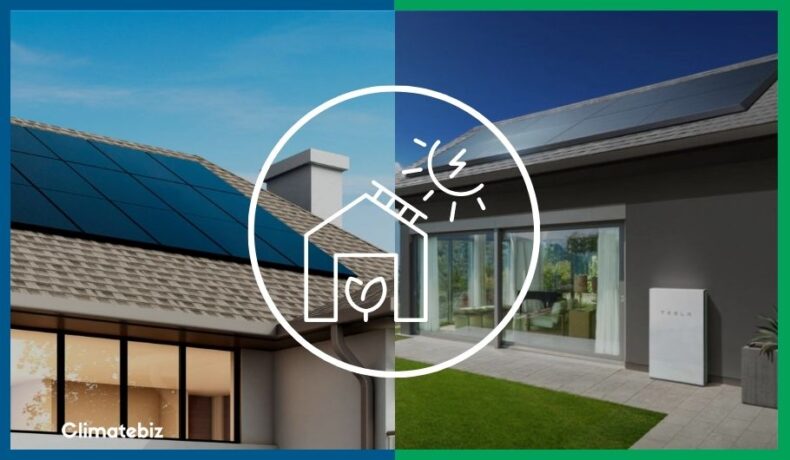The battle between solar tech giants such as SunPower vs. Tesla, more specifically Tesla Energy, will be more common in the future.
Solar energy has come a long way since its humble beginnings in 1909. From feeble, costly solar water heating systems, solar technologies have provided notable breakthroughs toward decarbonizing grids and running space satellites.
It’s unsurprising to see large organizations such as the U.N. and SEIA take giant strides towards net-zero carbon systems and sustainability, with solar at the dead center.
With all countries setting ambitious climate change goals, we can expect many companies to jockey for the top spots and make the most out of this demand surge.
This will culminate in close-knit competition in the solar energy market, which we’ll all benefit from.
Table of Contents
SunPower vs. Tesla (Breakdown)
Let’s look at the SunPower vs. Tesla Energy tale of the tape:
| Specifications | SunPower | Tesla Energy |
|---|---|---|
| Solar Panel Manufacturing | Made In-house (Maxeon) | Outsourced |
| Revenue (Q3, 2022) | SunPower: $470 million – Maxeon: $275 million | $1,2 billion |
| Efficiency Range | 345W @ 21.2% – 440W @ 22.8% | 395W @ 20.1 % – 405W @ 20.6% |
| Output Warranty | 25 years | 25 years |
| Solar Product Warranty | 25 years 40 years (Maxeon panels) | 25 years |
| Average Price Per Watt | Approximately $3.92 | $2.30 |
| Warranty of Other Components | Inverter (25 years) Mount (25 years) Monitoring System (10 years) Energy Storage (10 years) | Inverter (10 years) Mount (10 years) Monitoring System (None) Energy Storage (10 years) |
SunPower vs. Tesla: Tesla Overview
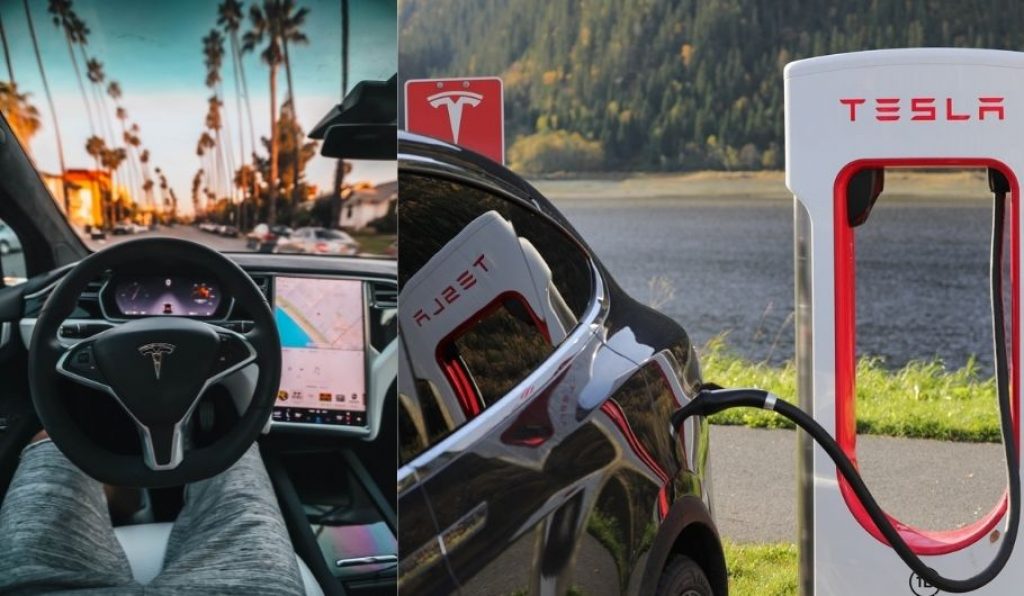
While the Tesla name is synonymous with electric cars, the company has been part of the solar market for quite some time.
Tesla Energy is a division of Tesla, Inc. that designs, manufactures, and sells energy storage systems and solar products.
The division was established in 2015 to expand Tesla’s presence in the energy market and provide sustainable energy solutions to customers.
Product-wise, Tesla has three main solar offerings:
- Solar roofing: Tesla solar roof tiles/shingles
- Solar panels: From third-party manufacturers
- Energy storage: Tesla Powerwall
Tesla Solar Roof
During its launch, Tesla Energy marketed its solar roof tiles as an innovation over the typical rooftop.
Based on our analysis, Tesla solar roofs are better than traditional rooftops since they allow you to earn your money back over time. And the best part? They don’t even look like solar panels (see figure below.)

Source: Tesla, Inc.
So, is a Tesla Solar Roof worth it? We believe opting for solar panels is still the quickest way to get your money back. Not to mention, Tesla is not ready to roll out solar roofs on a massive scale.
Tesla Solar Panels
Even though Tesla’s solar panels are slapped with the Elon Musk seal of approval, Tesla does not manufacture its solar panels.
Panasonic was the initial supplier of Tesla’s solar cells before moving to other third-party manufacturers in the second quarter of 2021.
The truth is, finding Tesla’s solar panel specifications is an arduous task compared to its PV peers. Check out their website and see for yourself. However, if you look hard enough, you’ll see that their main residential solar offerings post-Panasonic are as follows:
| Specifications | T395H | T400H | T405H |
|---|---|---|---|
| Rating / Efficiency | 395W @ 20.1% | 400W @ 20.4% | 405W @ 20.6% |
| Product and Power Warranty | 25 years | 25 years | 25 years |
| Guaranteed Output % At 25-Year Mark | 86% | 86% | 86% |
Since Tesla solar panels are more economical than Tesla solar roofs, we will use them as the point of comparison with SunPower’s solar panels for this Sunpower vs. Tesla article.
Tesla Powerwall
The Tesla Powerwall is a home battery system that stores energy generated from solar panels or the grid and makes it available anytime. Moreover, it can provide backup power during power outages.
The Powerwall is designed to be simple and easy to install, whether wall-mounted or on the ground. Additionally, it’s designed to be scalable, so you can install multiple Powerwalls together to increase the total storage capacity.
Furthermore, you can integrate it into an existing solar system or use it as a standalone backup power source.
For reference, here’s a look at some specifications for the latest Tesla Powerwall 2.0 model:
| Usable capacity | 13.5 kWh |
| Continuous power rating | 5.0 kW |
| Depth of Discharge (DoD) | 100% |
| Round-trip efficiency | 90% |
| Warranty | 10 years (unlimited cycles) |
| End of warranty capacity | 70% |
Related reading: How Much Does A Tesla Powerwall Cost? (Value guide)
SunPower Vs. Tesla: SunPower Overview
SunPower was first established in 1985 and has been headquartered in Silicon Valley ever since.
The company provides green-tech energy solutions to consumers by selling, installing, and financing solar power products such as panels, batteries, monitoring software, and mounting hardware.
A point of pride for this solar giant is that they’re the only U.S.-based company that’s been around longer than its 25-year warranty.
In August 2020, SunPower Corporation decided to split into two separate public companies:
- SunPower: responsible for supplying all solar-related services to customers.
- Maxeon Solar: the company responsible for producing the high-efficiency solar panels that SunPower is known for
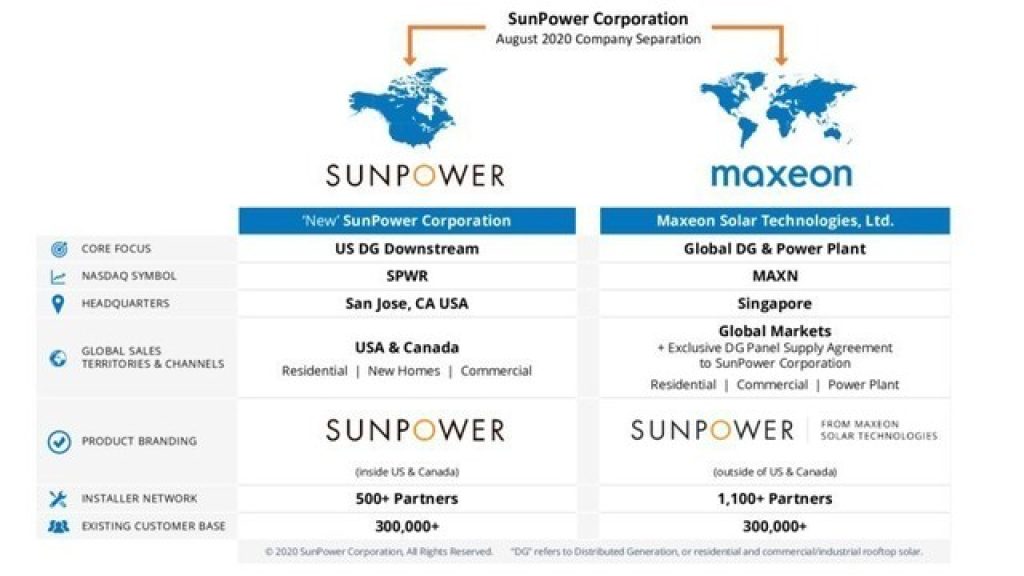
Currently, SunPower’s primary offerings include:
- Solar panels: SunPower Performance & Maxeon panels.
- Energy storage: SunPower SunVault Storage
SunPower solar panels
SunPower has two primary ranges of solar panels to choose from:
Performance Panels
SunPower’s Performance Panels make up the make cost-effective offerings from the company.
These panels use a distinct shingled PERC-cell (based on P-type silicon) design made up of six strings of shingled cells in parallel. This makes the panels more resistant to micro-cracks — a common issue among convention square cell panels.
The P-series is available in both DC and AC variants, and its residential panels range from 370 to 415 watts.
Here’s a closer look at some of the P-Series panels:
| Performance 6 Series | SPR-P6-395-BLK | SPR-P6-400-BLK | SPR-P6-405-BLK |
|---|---|---|---|
| Rating/ Efficiency | 395W @ 20.1% | 400W @ 20.4% | 405W @ 20.6% |
| Product and Power Warranty | 25 years | 25 years | 25 years |
| Guaranteed Output % At 25-Year Mark | 87.2% | 87.2% | 87.2% |
Maxeon Panels
SunPower’s Maxeon range represents the company’s highest-quality panels.
These panels comprise high-quality Interdigitated Back Contact (IBC) cells built using high-purity N-type silicon. Additionally, they use fine fine-grid conductors integrated into the rear side of their cells.
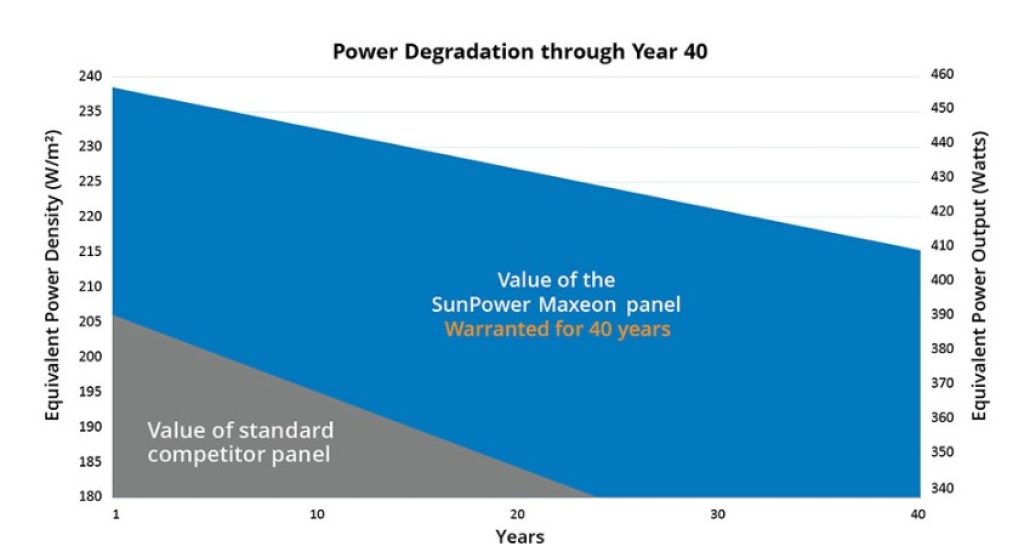
Source: SunPower
Ultimately, these design choices come together to form panels with extremely high levels of performance, efficiency, and very low degradation rates — approximately 0.2%/year compared to the average of 0.75%/year.
For these reasons, SunPower and Maxeon back this range of solar panels with a whopping 88.25% retained capacity after a 40-year period
Here’s a closer look at some of the P-Series panels:
| Maxeon 3 Series | SPR-P6-395-BLK | SPR-P6-400-BLK | SPR-MAX3-410-BLK |
|---|---|---|---|
| Rating / Efficiency | 395W @ 22.3% | 400W @ 22.6% | 410W @ 21.6% |
| Product and Power Warranty | 40 years | 40 years | 40 years |
| Guaranteed Output % At 25-Year Mark | 92% | 92% | 92% |
SunPower SunVault
SunPower’s SunVault storage is the company’s answer to Tesla’s Powerwall.
This energy storage solution is a seamless backup power method during power outages and for general use.
You can easily integrate these units into existing SunPower solar systems. On the downside, SunVault systems are not compatible with third-party solar equipment.
Here’s a closer look at what the SunVault has to offer:
| Usable capacity | 13 to 26 kWh |
| Continuous power rating | 6.8 kW |
| Depth of Discharge (DoD) | 100% |
| Round-trip efficiency | 85% |
| Warranty | 10 years (unlimited cycles) |
| End of warranty capacity | 70% |
SunPower vs. Tesla: Which Company Produces Better Quality?
Both SunPower and Tesla provide quality solar panels and ESS solutions. But which company comes out on top?
Solar panel comparison
First, let’s compare some solar panel offerings:
395W panels
| T395H | SPR-P6-395-BLK | SPR-P6-395-BLK | |
|---|---|---|---|
| Efficiency | 20.1% | 20.1% | 22.3% |
| Product and Power Warranty | 25 years | 25 years | 40 years |
| Guaranteed Output % At 25-Year Mark | 86% | 87.2% | 92% |
400W panels
| T400H | SPR-P6-400-BLK | SPR-P6-400-BLK | |
|---|---|---|---|
| Efficiency | 20.4% | 20.4% | 22.6% |
| Product and Power Warranty | 25 years | 25 years | 40 years |
| Guaranteed Output % At 25-Year Mark | 86% | 87.2% | 92% |
405W panels
| T405H | SPR-P6-405-BLK | SPR-MAX3-410-BLK | |
|---|---|---|---|
| Efficiency | 20.6% | 20.6% | 21.6% |
| Product and Power Warranty | 25 years | 25 years | 40 years |
| Guaranteed Output % At 25-Year Mark | 86% | 87.2% | 92% |
Energy Storage Comparison
Now let’s take a look at these companies’ respective energy storage options:
| Powerwall 2.0 | SunVault | |
|---|---|---|
| Usable capacity | 13.5 kWh | 13 to 26 kWh |
| Continuous power rating | 5.0 kW | 6.8 kW |
| Depth of Discharge (DoD) | 100% | 100% |
| Round-trip efficiency | 90% | 85% |
| Warranty | 10 years (unlimited cycles) | 10 years (unlimited cycles) |
| End of warranty capacity | 70% | 70% |
Conclusion
Looking at it from a long-term investment standpoint, SunPower’s residential PV modules take the cake thanks to its superior PV efficiency and ability to minimize output degradation.
Moreover, it has a strong relationship with a quality manufacturer in Maxeon, and it’s easy to find out where its panels are made.
Looking at energy storage, the winner is not so clear. While Tesla’s Powerwall 2.0 certainly edges out SunPower’s SunVault in terms of round-trip efficiency, its continuous power rating is not as high. Moreover, Tesla does not have a model that rivals the larger SunVaults 26 kWh capacity.
However, the SunVault has one big drawback — unlike the Powerwall 2.0, it cannot be integrated with third-party solar systems.
For this reason, we believe the Powerwall 2.0 is the winner.
SunPower vs. Tesla: Which Company Is Cheaper?
According to the NREL’s white paper report, SunPower’s residential solar panels cost around $3.92 per watt — ouch! This is pretty high, considering that the median price of residential solar in the U.S. is $2.77 per watt.
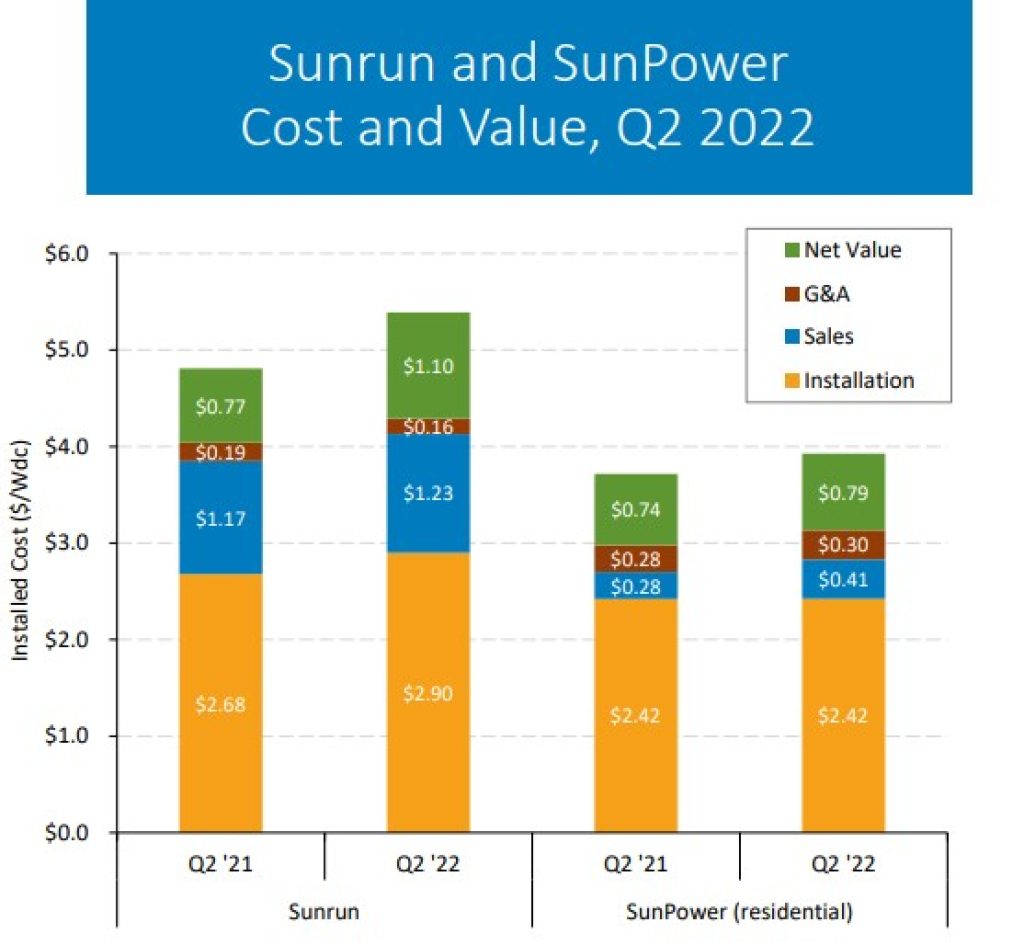
Source: 2022 NREL white paper
However, Electrek.co recently reported that Tesla has decided to become competitive in the pricing arena, stating that Tesla’s price reduction in its installation service will come from lowered installation costs and more powerful solar panel modules. This results in a $2.44 per watt cost before FTCs (Federal Tax Credits).
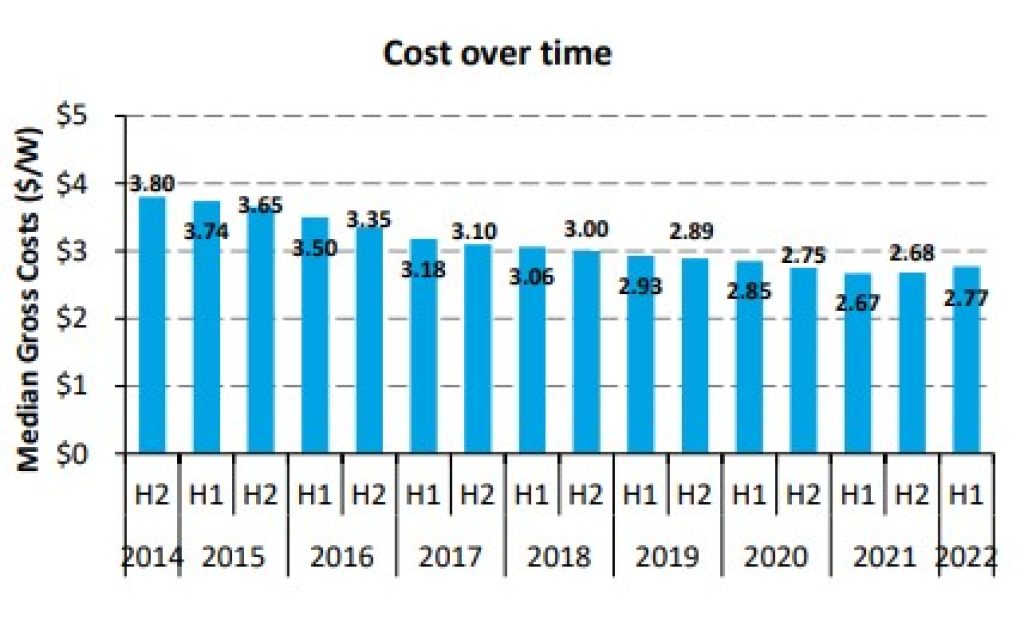
Source: 2022 NREL white paper
In addition, Tesla has made the consultation / quoting process more seamless thanks to its convenient solar panel calculator.
That said, SunPower is still holding its punches in this area. In their opinion, talking to a consultant is still the way to go to get a free evaluation.
While SunPower is not wrong, the concept of empowering your potential clients does give Tesla the upper hand, at least initially. Not to mention this goes really well with their price-matching strategy.
The Climatebiz Insight
Looking at these figures, a 5kW solar panel system in the United States will cost you around:
- SunPower: $3.92 x 5,000 watts = $19,600
- Tesla: $2.30 x 5,000 watts = $11,500
However, while the solar cell efficiency of SunPower helps reduce the cost of its entire system, Tesla still has a lower price for a 5kW residential system.
Note to our readers: These systems will offset 78% of a home’s electricity consumption with a monthly bill of $130-$150, depending on your state.
Which company is right for you?
Here’s an updated summary:
| Specifications | SunPower | Tesla Energy |
|---|---|---|
| Solar Panel Manufacturing | Made In-house (Maxeon) | Outsourced |
| Revenue (Q3, 2022) | SunPower: $470 million – Maxeon: $275 million | $1,2 billion |
| Efficiency Range | 345W @ 21.2% – 440W @ 22.8% | 395W @ 20.1 % – 405W @ 20.6% |
| Output Warranty | 25 years | 25 years |
| Solar Product Warranty | 25 years 40 years (Maxeon panels) | 25 years |
| PricePper Watt | Approximately $3.92 | $2.30 |
| Warranty of Other Components | Inverter (25 years) Mount (25 years) Monitoring System (10 years) Energy Storage (10 years) | Inverter (10 years) Mount (10 years) Monitoring System (None) Energy Storage (10 years) |
Cost for a 5kW system
| Specifications | SunPower | Tesla |
|---|---|---|
| Cost ($ per watt) | Approximately $3.92 | $2.30 |
| System Size | 5kW | 5kW |
| Total Cost | $19,600 | $11,500 |
Climatebiz professional advice
If, at this point, you’re still undecided, consider the following:
Go with Tesla if you:
- Are not fond of spending hours with consultants and installers;
- Are not a fan of going through electricity bills to get precise sizing (an intelligent online estimate is fine);
- Want a cheaper solar system at face value; (Tesla: $11,500 vs. SunPower $19,600) for the same output is a huge gap in the initial lump sum.
- Value looks of solar panels on roofs (this is debatable, though).
In a nutshell, Tesla buyers prefer convenience and don’t mind a broader solar system size estimate. The cheaper initial cost and near-term savings are appealing to you as well.
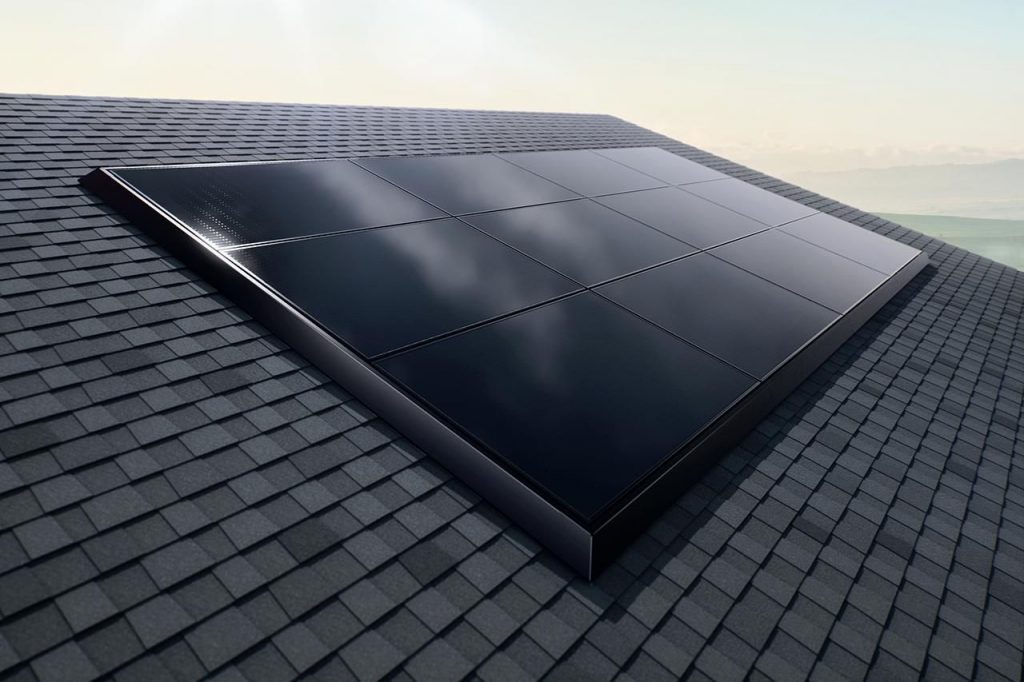
Source: Tesla, Inc.
Go with SunPower if you’re:
- Detail-oriented and a fan of exhaustive approaches (leave no stone unturned!) like our lengthy deep dives on U.S. Solar Panel Installations.
- A fan of a more tailor-fitted approach.
- Value good warranty established reputations and love the 92% output guarantee after 25 years.
Bottom-line
SunPower is your best bet if you:
- Value higher solar panel production capacity over 25 years (long-term savings).
- Love a hands-on approach (which includes assistance in licensing, permitting, HOA approvals, and all that regulatory stuff).
- Enjoy the peace of mind that comes with warranties from a company that has been in the game long enough.
Don’t completely ignore solar roofs
While we agree that the Tesla solar roof cost cannot compete with traditional solar panels, we don’t want to remove it from your options entirely.
Tesla’s think tank definitely had a target market in mind when it created the Tesla Solar Roof concept. And given that it’s a relatively new and unique product, it’s crucial for you to learn everything you can about Tesla Solar Roofs before deciding if they’re right for you.
Final thoughts
We’re confident you can decide based on the information we provided you in this SunPower vs. Tesla discussion.
Just remember; your solar system will be on your roofs for 25+ years. Therefore, your chosen company will determine your renewable energy experience for decades.
Enjoy your savings while helping mother earth!

